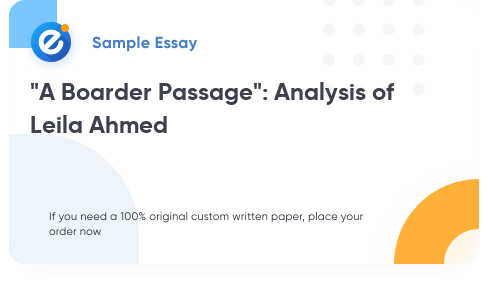
A Border Passage is a personal memoir that is based on Ahmed’s life from childhood to her adulthood and explores the themes of religion, culture, racism, and governance. Ahmed’s growing up was colluded with various cultures as she lived in a country that embraced other people, yet she could not be accepted in college at Cambridge. She was forced to understand her identity through many cultures that she grew up with after experiencing a collusion of cultures from Cairo, Yugoslavia, Syria, and Lebanon. This paper therefore discusses Ahmed’s relationship between identity, narrative, and politics in the most candid manner to inform the reader.
Ahmed understands the relationship between identity and politics through feelings of cultural misalignment that she is exposed to, especially as an Egyptian student in Cairo and as a racially bullied student in Cambridge. She says, “If the president of Egypt himself was searching for identity, no wonder that I crossing the threshold into my teenage years in that era of revolution would find myself profoundly confused and conflicted.” Identity is very important; that is why despite being exposed to different cultures, Ahmed could not settle down, but instead resolved to find her relevance in life by finding her true identity. People fully understand who they are in life when their opinions about issues of life make sense in this world. If the president himself was forced to find his own identity, then it means that knowing who one is and what defines one is meaningful in this life. Everyone is proud to be associated with a certain culture or practice in order to build a sense of belonging (Ahmed 10).
Calculate the cost of essay
As a child, Ahmed grew through many cultures ranging from Yugoslavian, the harsh principles of Islam, and the Lebanese and Syrian cultures that she went through at school and at home. It was obvious that a reasonable person will want to define him or herself away from the many confusing and racially oriented cultures to establish a true self. She admits that, “it was as if there was to life itself a quality of music in that time, the era of my childhood.” There was much noise disruption and one had to be keen as a child to identify which is the right way as everyone has his or her own way of understanding matters in life. These interpretations created a conflict of interest that had to be approached rationally in order to establish a true sense of being away from the many cultures at hand (Ahmed 1).
Actually, there is woman’s and man’s Islam, for instance her mother’s and aunt’s type of Islam was that which was hinged to oral tradition that defined how religion should teach people kindness and coexistence. On the other hand, men championed for harsh Islam that was based on written texts and imposed on people to adhere to as the best way of living. Ahmed saw fundamentalism arising from the men’s type of religion, which literary destroyed politics and moral value of how life should be approached. Women and men interpreted Islam differently and lived their lives differently as well based on what they thought was the right interpretation of Islam. Ahmed discovered these differences from her grandmother’s living room when men and women gathered to discuss the religion.
Limited Time
special offer
The types of conflicts that Ahmed experienced are real life issues that many people go through in their daily life. If a person fails to remain objective, he or she can easily be carried away with the mixed cultures to the extent that they can forget their original roots to be politically or culturally coherent. To Ahmed, the world is as if a narrative told in music that needs a sober mind to understand it. In addition, it is the duty of an individual to deny whatever is false and seek the truth in order to live life that is full of meaning, belonging, and dimension.
This world is filled with people who want to manipulate other just like the “Harem perfect” where older people want to dominate the young people. Life is very boring when people impose thoughts on the other people’s minds. An identity is found in personal decisions to live life this way or another (Ahmed 150). In conclusion, people should not use religion as an excuse to abuse people. Politics was just all right until men introduced their authoritarian Islam that destroyed life.

